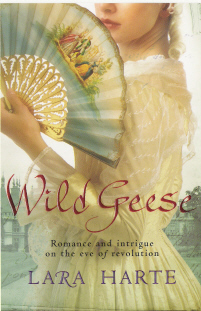LARA HARTE
Wild Geese
This is my third novel, published in 2003 by Weidenfeld and Nicolson. As the title suggests, it’s set among the Irish Wild Geese community, those emigrants who fled Penal Law Ireland during the seventeenth and eighteenth centuries in search of a better life in Continental Europe. Wild Geese is quite a topical story, as 2007 marks both the 400th Anniversary of The Flight of the Earls from Ireland and the Bicentenary of the British abolition of the slave trade. Slavery is a key issue in the novel. While researching the novel, I discovered that Irishmen had played a prominent role in the development of the French slave trade, and wondered how their notoriety might clash with the sensibilities of fictional characters caught up in the pre-revolutionary momentum of the 1780’s.
This led to the creation of the novel’s heroine, Isabella Carroll, who has been brought up by her affluent aunt in Dublin’s Catholic merchant community. As a young eighteenth century woman, she is expected to do as she is told by her male guardian and docilely accept an arranged marriage. Instead she flees to Paris, her head full of romantic notions about the Wild Geese, seeking a reunion with her father, whom she has never met. In her father’s house, she meets his cousins, the glamorous, artistic Brighid, who comes from one of the old noble Irish families who were dispossessed by the Penal Laws, and Brighid’s unhappy but pragmatic daughter Hélène. Together, they decide to exploit Isabella’s idealism to further their own ends. . . .
I’ve been asked if I found it difficult to write in an eighteenth century voice after having previously written two utterly contemporary, first person narratives. But as I always try to create the voice that best expresses the story I’m trying to tell, the answer is that I found it no more or less difficult than creating any voice. I do think it’s important for writers, especially young writers, to experiment with style and voice for the sake of their own creative development. Unfortunately, modern marketing trends and the branding of writers mean that many find themselves under pressure to fit into a neatly-defined little box and to write the same type of book over and over again, which is boring for writers and readers alike. I am not the kind of writer who will advise aspiring writers to ‘study the market and see what’s successful so that you can write the kind of book a publisher will want.’ I’ll say, ‘read as many books as possible, because you’ll learn a lot from them, and it’s good to see what other writers are doing. But then go off and write your own book, because good writing comes from experimentation and individuality. And enjoy it as much as you can, because the world of publication is one of hard knocks. You are unlikely to make your fortune from it, so you should at least know the satisfaction and fulfilment of writing the book you yourself want to write.’
Yes, a lot of eyebrows were raised by my choice of subject-matter for a third novel. However, most reviewers welcomed the new direction I had taken. Siobhan Cronin wrote in the Irish Independent that ‘Harte’s decision to move in a literary, rather than popular, direction with her writing will be welcomed by lovers of good prose . . . You could say Harte has finally found her wings.’ Clodagh Finn of the Sunday Independent was of the opinion that ‘Harte has a delicious sense of wickedness that explodes in the stolid drawing-room . . . she is an assured story-teller . . . the underlying promise of adventure keeps the pages turning . . . an ambitious work with lots to recommend.’ And the Good Book Guide found that ‘with an appealingly feisty heroine, and interesting insights into the constraints imposed by 18th-century society, this makes for entertaining reading.’ Éilis Ní Dhuibhne included Wild Geese among her best books of 2003 in the Irish Times, writing that 'the astonishing Lara Harte, who published her first novel at the age of twenty, has gone from strength to strength and has written a truly impressive novel.'
